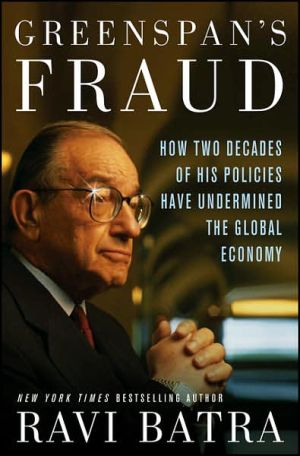Greenspan's Fraud: How Two Decades of His Policies Have Undermined the Global Economy
For two decades Federal Reserve Chairman Alan Greenspan has held reign over economic policy, outlasting three presidents. His long tenure has had a profound effect on global economics and on individuals. In this hard-hitting exposé, international bestselling author Ravi Batra takes sharp aim at Greenspan's policies since he came into power. Greenomics, Batra argues, has extracted trillions of dollars from the American middle class and sharply benefited the rich, while protecting big business....
Search in google:
An explosive critique of Alan Greenspan's economic policies by New York Times bestselling author Ravi Batra Publishers Weekly In 1987, Alan Greenspan was appointed chairman of the Federal Reserve, and Batra had a bestseller predicting a depression deeper than the Great Depression, lasting from 1990 to 1996. Batra's second book, two years later, predicting the crash of 1990 did less well, and his books predicting disaster in 1996, 1997, 1998 and 1999 found fewer readers, lucid as they were. Batra did correctly predict a stock market downturn in 2000, but erred by blaming the Y2K computer bug and forecasting high inflation and deep, long lasting negative growth. Now Batra has switched from predicting the future to criticizing the past. Readers expecting sensational charges will be disappointed. "This is not fraud in the legal sense," the author reassures us. Instead, Greenspan has "seriously afflicted the finances of millions of families." Batra faults Greenspan's views on social security, minimum wage, taxes and the trade deficit. As always, his economic arguments are expressed elegantly. Missing is a direct link to Greenspan, who had only a peripheral advisory role in these issues (his job is setting interest rates, financial policy and bank regulation) and voices only highly modulated views when he does give opinions. The misplaced focus weakens the sound economic arguments, and the title is sensationalized at best. 100,000 first printing. $100,000 ad/promo. (May 9) Copyright 2005 Reed Business Information.
1The two faces of Alan Greenspan12The Social Security fraud113Greenomics : free profits define free markets474Greenspan's intellectual fraud735Greenspan and the globe1236What causes a stock market bubble and its crash?1417The income tax rate and our living standard1698Does the minimum wage create unemployment?1839Greenspan and the galloping trade deficit19510The legacy of Greenomics21711Economic reform235
\ From the Publisher"The most thoroughgoing assault on the Maestro's legacy so far."—Cecil Johnson, Fort Worth Star-Telegram (syndicated) "Here, finally, is the dark truth about Alan Greenspan. In this chilling exposé of one of the most powerful men of our time, Ravi Batra reveals Greenspan for who he secretly is: An ideologue who has waged war on the American Dream and imperiled the world economy. Greenspan's Fraud is a terrifying book."—David Callahan, author of The Cheating Culture: Why More Americans Are Doing Wrong to Get Ahead "As always, his economic arguments are expressed elegantly."—Publishers Weekly"A scathing indictment of Greenspan's policies and person actions.... Batra is earnest, passionate, and furious—and he provides a lot of numbers to back up his claims. Whether or not you agree with him, the book is an unsettling read." —BizEd\ "[H]is economic insights recommend this book to most public and academic libraries."—Lawrence R. Maxted, Library Journal\ "Ravi Batra is one of the world's most controversial economists. Beneath the surface of his often contentious conclusions lies a deeper source of the controversy. He does not accept one of the most fundamental fallacies of modern macroeconomic theory—the assumption that macroeconomic policy has no distribution effects.... Professor Batra turns this oversimplifying assumption upside down.... [W]e cannot and should not ignore him..."—William A. Barnett, Oswald Distinguished Professor of Macroeconomics, University of Kansas and Editor, Macroeconomic Dynamics\ PRAISE FOR RAVI BATRA'S OTHER BOOKS\ "Dr. Batra writes about his subject as clearly as if he were telling bedtime stories."—Christopher Lehmann-Haupt, New York Times\ "Batra has set the standard for economic analysis . . . Think about it. Before Batra, who ever heard of phrases like 'jobless recovery,' 'contained depression,' and 'deflationary boom.'"—John Liscio, Barron's\ "When it comes to the bottom line so beloved of economists, one can learn a lot about events by thinking about them in cyclical regularities, of which Batra gives a novel and brilliant exposition."—Lester C. Thurow, Professor, MIT\ "Batra [is] a scholar who has earned a considerable reputation as an expert on trade."—Albert Crenshaw, Washington Post\ "Ravi Batra has made an outstanding reputation in the United States as an international economic theorist in the best Western tradition."—Leonard Silk, New York Times\ \ \ \ \ \ Publishers WeeklyIn 1987, Alan Greenspan was appointed chairman of the Federal Reserve, and Batra had a bestseller predicting a depression deeper than the Great Depression, lasting from 1990 to 1996. Batra's second book, two years later, predicting the crash of 1990 did less well, and his books predicting disaster in 1996, 1997, 1998 and 1999 found fewer readers, lucid as they were. Batra did correctly predict a stock market downturn in 2000, but erred by blaming the Y2K computer bug and forecasting high inflation and deep, long lasting negative growth. Now Batra has switched from predicting the future to criticizing the past. Readers expecting sensational charges will be disappointed. "This is not fraud in the legal sense," the author reassures us. Instead, Greenspan has "seriously afflicted the finances of millions of families." Batra faults Greenspan's views on social security, minimum wage, taxes and the trade deficit. As always, his economic arguments are expressed elegantly. Missing is a direct link to Greenspan, who had only a peripheral advisory role in these issues (his job is setting interest rates, financial policy and bank regulation) and voices only highly modulated views when he does give opinions. The misplaced focus weakens the sound economic arguments, and the title is sensationalized at best. 100,000 first printing. $100,000 ad/promo. (May 9) Copyright 2005 Reed Business Information.\ \ \ Library JournalThe author of a number of sensationalist books, such as The Great Depression of 1990, Batra (economics, Southern Methodist Univ.) here attacks Alan Greenspan as both economic advisor to President Reagan (for the 1981 income tax cut and for the 1983 Social Security tax hike) and Federal Reserve chair since 1987. Though he spends too much time arguing that Greenspan has aided wealthy friends and politicians, Batra does make many important points. He shows that since 1981, taxes have increased proportionately for middle- and low-income U.S. workers while decreasing for the wealthiest and that wage growth for the average worker has been stagnant despite increases in worker productivity. Because lower-income workers have less disposable income, theorizes Batra, the country has experienced low economic growth and a high level of debt-debt that is now propping up the U.S. stock market and economy. Batra also gives a good explanation of the persistent U.S. trade deficit, which he says results from a combination of currency manipulation by foreign nations and the collapse of domestic manufacturing. Batra's criticisms of Greenspan may be exaggerated, but his economic insights recommend this book to most public and academic libraries.-Lawrence R. Maxted, Gannon Univ., Erie, PA Copyright 2005 Reed Business Information.\ \








